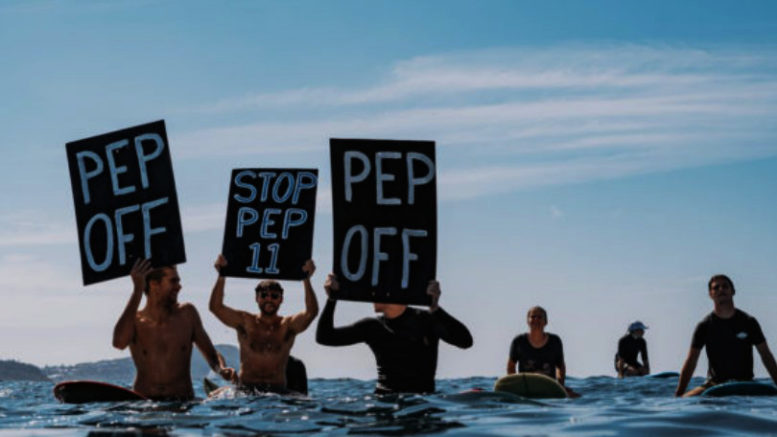In a move that has sparked both hope and confusion, Federal Industry Minister Ed Husic has issued a “preliminary determination” on the controversial PEP11 gas and oil exploration licence.
While environmental advocates hailed this as a victory, a closer look reveals that the government’s stance might not be as definitive as it seems—it’s more of a “Nah, yeah, nah” situation, leaving both sides wondering if this is genuine progress or mere political theatre.
A Brief Overview
PEP11 (Petroleum Exploration Permit 11) is a highly contentious project aimed at exploring oil and gas reserves off the coast of New South Wales, specifically in the area stretching from Newcastle to Sydney.
The project has long faced staunch opposition from environmental groups, local communities, and state politicians, who argue that offshore drilling could have devastating consequences for marine life, tourism, and the climate.
However, proponents of the project, including its key players Advent Energy and Bounty Oil & Gas, argue that the potential discovery of new gas reserves could help Australia address its energy needs, especially amid rising energy prices and global instability in supply chains.
As energy security becomes a hot-button issue, PEP11 has remained a focal point of the ongoing debate between economic development and environmental preservation.
Husic’s ‘Preliminary Determination’: What It Really Means
When Ed Husic issued a “preliminary determination” on the PEP11 licence, many were quick to interpret it as the death knell for the project.
Social media posts have trumpeted the news that the federal government had effectively killed off PEP11, appeasing environmental activists and the growing constituency of climate-conscious voters.
But not so fast.
Husic’s decision is far from final. In fact, the “preliminary determination” is more akin to hitting the pause button rather than a complete rejection of the project.
It signals that the minister is leaning towards denying the licence, but it also provides the proponents an opportunity to make their case. In essence, Advent Energy and its partners can now submit further arguments or adjustments to their proposal in an effort to sway the minister’s final decision.
This process is a classic example of bureaucratic hedging—a way to signal opposition without outright shutting down a project that may still have political or economic merit. It’s a way for the government to appear aligned with environmental concerns while leaving the door open for future approval, should the circumstances—or political winds—change.
Virtue Signalling or Genuine Action?
For critics, the “preliminary determination” smacks of virtue signalling—an attempt to placate environmentalists without fully committing to a decision that could upset more conservative or industry-focused segments of the electorate. In a time when governments are under pressure to address climate change, moves like this provide a veneer of action, even if the substance remains murky.
This is not the first time the PEP11 project has been in political limbo. Previous Federal Minister for Resources, Keith Pitt, was a vocal supporter of the project and had attempted to renew the licence before being blocked by Prime Minister Scott Morrison.
Morrison’s move was widely seen as an effort to protect Liberal-held seats along the NSW coast that were vulnerable to environmental backlash.
Now, under a new Labor government, Ed Husic is navigating similar political waters. His preliminary determination can be seen as a strategic move—allowing him to appear responsive to public sentiment without completely closing the door on a project that could still have economic appeal.
The path forward for PEP11 ?
So, what happens next? The ball is now in the court of the PEP11 proponents. Advent Energy and Bounty Oil & Gas must present new evidence or make amendments to their plan to convince Husic that the project can proceed without unacceptable environmental or social consequences.
But even if they do make a compelling case, the final decision may still be months away. In the meantime, both sides of the debate are preparing for the next phase of the battle. Environmental groups are likely to intensify their campaigns, while industry advocates will stress the importance of energy security and economic growth.
The tug of war continues
Public opinion on PEP11 remains sharply divided. Coastal communities along the NSW coast are overwhelmingly opposed to the project, fearing the environmental risks and potential impact on local industries such as tourism and fishing. These voters played a crucial role in the Liberal Party’s losses during the 2022 federal election, and the Labor government is well aware of the need to maintain their support.
On the other hand, with global energy prices skyrocketing and growing concerns about energy security, there is a significant argument for exploring new domestic energy sources. Proponents of PEP11 argue that offshore gas could be a crucial part of Australia’s energy transition, serving as a “bridge fuel” as the country moves towards more renewable energy sources.
A real decision still to come
In the end, Husic’s preliminary determination on PEP11 is a classic case of political manoeuvring. While it may look like a step towards shutting down the project, the reality is much more nuanced. The proponents of PEP11 now have a chance to push back, and the future of the project remains uncertain.
For now, the government has managed to walk a fine line between appeasing environmental concerns and keeping its options open. Whether this is a masterclass in political strategy or just more bureaucratic delay tactics remains to be seen.
One thing is clear: the PEP11 saga is far from over.



